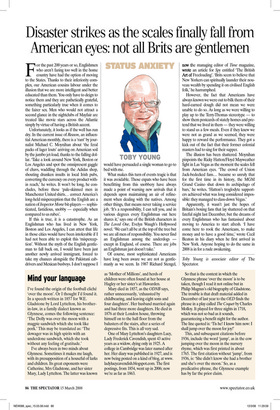Disaster strikes as the scales finally fall from American eyes: not all Brits are gentlemen
For the past 200 years or so, Englishmen who aren’t faring too well in the home country have had the option of moving to the States. Thanks to their inferiority complex, our American cousins labour under the illusion that we are more intelligent and better educated than them. You only have to deign to notice them and they are pathetically grateful, something particularly true when it comes to the fairer sex. Men who would not attract a second glance in the nightclubs of Mayfair are treated like movie stars across the Atlantic simply by virtue of having a British accent.
Unfortunately, it looks as if the well has run dry. In the current issue of Reason, an influential American monthly, there is a ‘rant’ by journalist Michael C. Moynihan about ‘the feral packs of lager louts’ arriving on American soil by the jumbo jet-load, thanks to the falling dollar. ‘Take a look around New York, Boston or Los Angeles and spot the omnipresent gaggle of chavs, waddling through the Adidas shop, shouting drunken insults in local Irish pubs, converting the currency on every product within reach,’ he writes. It won’t be long, he concludes, before these ‘pale-skinned men in Manchester United shirts... correct America’s long-held misperception that the English are a nation of Inspector Morse bit-players — sophisticated, fastidious, snobby — especially when compared to us rubes’.
If this is true, it is a catastrophe. As an Englishman who has lived in New York, Boston and Los Angeles, I can attest that life in those cities would have been intolerable if I had not been able to exploit this ‘misperception’. Without the myth of the English gentleman to fall back on, I would have been just another newly arrived immigrant, forced to take my chances alongside the Pakistani cabdrivers and Mexican busboys. I don’t suppose I would have persuaded a single woman to go to bed with me.
What makes this turn of events tragic is that it was avoidable. Those expats who have been benefitting from this snobbery have always made a point of warning new arrivals that it depends upon maintaining an air of refinement when dealing with the natives. Among other things, that means never taking a service job. ‘It’s a responsibility, I can tell you, and in various degrees every Englishman out here shares it,’ says one of the British characters in The Loved One, Evelyn Waugh’s Hollywood novel. ‘We can’t all be at the top of the tree but we are all men of responsibility. You never find an Englishman among the underdogs — except in England, of course. There are jobs an Englishman just doesn’t take.’ Of course, most sophisticated Americans have long been aware we are not as gentlemanly as we seem. In 1987 Richard Stengel, he managing editor of Time magazine, an article for Spy entitled ‘The British f Freeloading’. ‘Brits seem to believe that New Yorkers can spiritually launder their nouveau wealth by spending it on civilised English folk,’ he harrumphed.
However, the fact that Americans have always known we were out to bilk them of their hard-earned dough did not mean we were unable to do so. As long as we were willing to play up to the Terry-Thomas stereotype — to show them postcards of stately homes and pretend that we lived in them — they were willing to stand us a few meals. Even if they knew we were not as grand as we seemed, they were happy to reward the performance. They got a kick out of the fact that their former colonial masters had to sing for their supper.
The illusion has been shattered. Moynihan pinpoints the Ricky Hatton/Floyd Mayweather fight in Las Vegas as the moment the scales fell from American eyes. ‘The crowd of Union Jack-bedecked fans... became so unruly that for the first time in its history, the MGM Grand Casino shut down its archipelago of bars,’ he writes. ‘Hatton’s troglodyte supporters achieved what was long considered impossible: they managed to class-down Vegas.’ Apparently, it wasn’t just the hopes of Britain’s boxing fans that lay shattered on that fateful night last December, but the dreams of every Englishman who has fantasised about moving to America to start afresh. ‘I have come here to rook the Americans, to make money and to have a good time,’ wrote Cecil Beaton in his diary when he first arrived in New York. Anyone hoping to do the same in 2008 is in for a rude awakening.


























































































 Previous page
Previous page